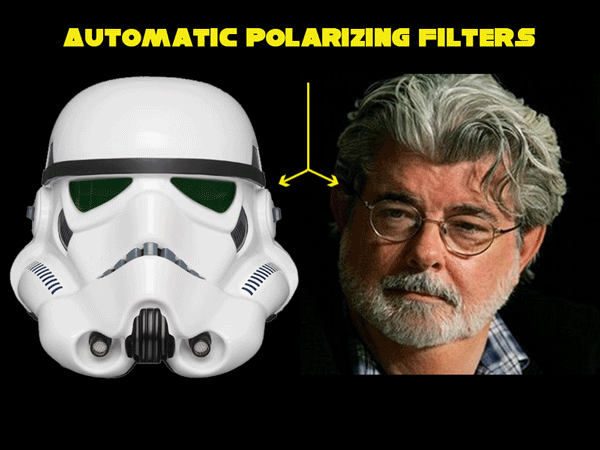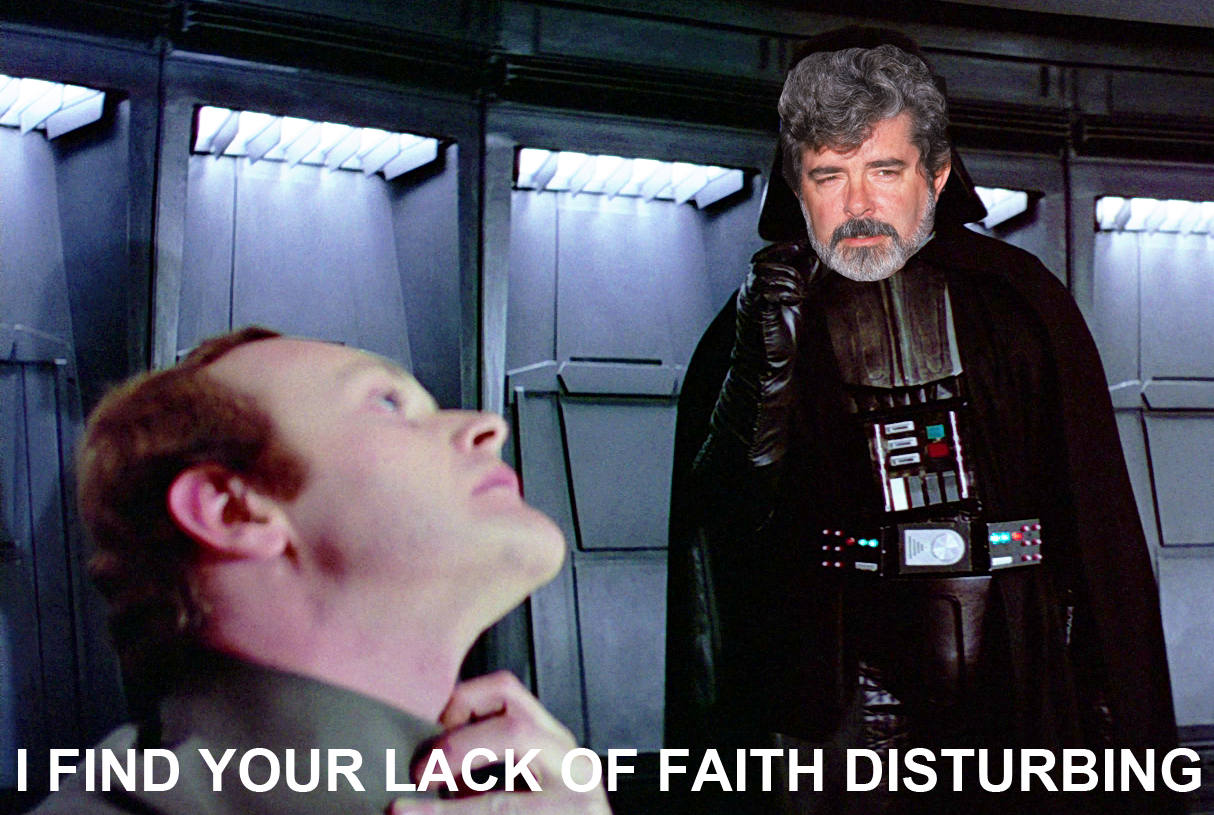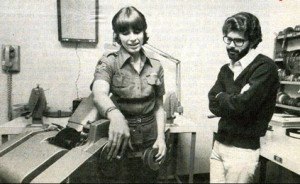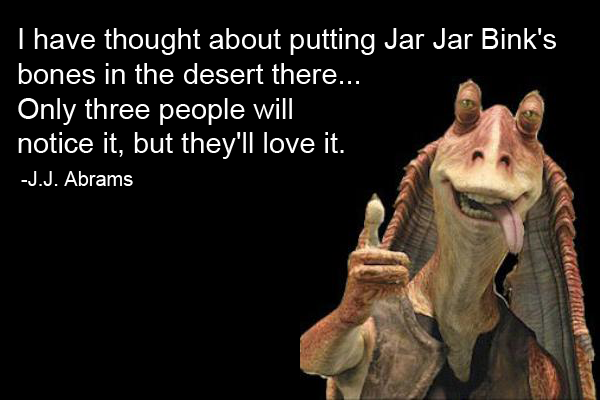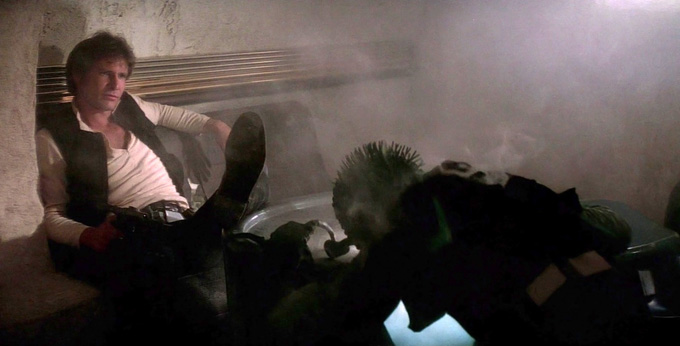7 Reasons Star Wars is Better Without George (Sith Lord) Lucas
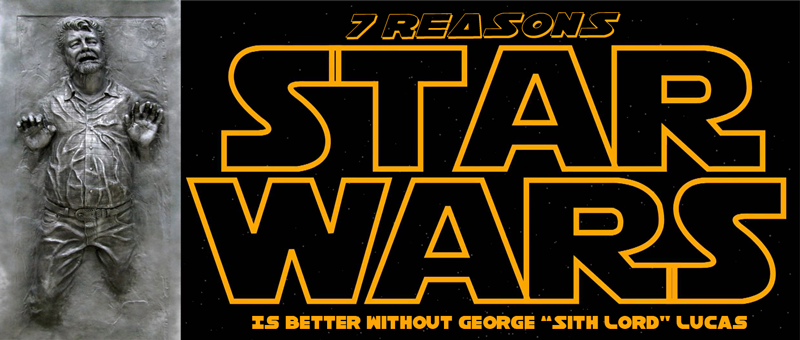 At Dish, We love TV, and we love Star Wars! It should come as no surprise that we have some strong opinions on the subject:
At Dish, We love TV, and we love Star Wars! It should come as no surprise that we have some strong opinions on the subject:
- Han Solo Vs Boba Fett – is a great idea, possibly the greatest idea ever
- Jar-Jar Binks is the worst
- The Kessel run cannot be made in less than 12 parsecs, because parsecs are a measure of distance not time
- the list goes on…
#1. Jedi Rocks – A Great Disturbance in the Force
When Jedi Rocks was shoe-horned into to Episode V, a small piece of nerd-dom was forever lost—It was as if millions of voices suddenly cried out in terror, and were suddenly silenced. What is the purpose of this scene? Truly, this is Sith-grade malevolence at work.#2. No One is Willing to Question Lord Lucas.
There is enough anecdotal (and very concrete) evidence to suggest that the scope of George Lucas’s elaborate vision gets in the way of smart decision making… Which is why his success is dependent on other people telling him No! The problem is, there’s no one left, willing to “confront the genius”. George Lucas’s level of fame have made it all but impossible find people willing to tell you N-O, or to even question the motivation of a choice. In turn we’re forced to deal with ill conceived additions and Episode II: Death by Parliamentary Procedure In 1974 George was working with his peers to create Star Wars. He found success with American Graffiti, and he was definitely running the show, but evidence abounds, that Star Wars was successful, not because of George Lucas, but in-spite of George Lucas. External collaborations saved the story (numerous revision’s with peers and professional script writers), the characters (improvised dialogue), set and miniature construction created story elements, and editing, which many say saved the film all together. He was challenged at every point, and forced to adapt to real problems, and all along, he was told no.#3. Sharing the Credit vs. Taking the Credit
Question: How many Films did George Lucas Direct between Episode IV in 1977 and Episode I in 1999? Answer: Zero. Null. Nada. Let’s keep in mind that we celebrate George Lucas’s contribution to film as a director, yet he’s only directed a handful of films.He has certainly kept busy “producing” films (a term reserved for those who either bank roll a film, help negotiate financing and organize the appropriate people and locations) and occasionally writing, but not directing. Why? Well, the truth is complicated. Here are just a few of the people George has been less than Willing to share credit with: Marcia Lucas – Film editing, script and story editing. Alan Dean Foster – Wrote the Star Wars novelization that pre-date the film, originally credited to George Lucas. Francis Ford Coppola and Steven Spielberg – George Lucas was never shy about leveraging his incredibly talented friends for advice on scripts and shots. Some see the many edits made to the original 3 films as an effort for George to put his stamp on the films, and to prove he’s worthy of the genius moniker. But even Chewbacca was awarded a medal (eventually…) after the battle of Yarvin, so there’s still hope for the un-credited. Unless, George continues to act like a bigger baby than Luke in A New Hope or Anakin in Attack of the Clones…#4. Hypocrisy and the Convenience of Revisionist History
Not long before the VHS re-release that brought us the first of many “revisions” and in his own words, addressing congress in 1988:“My name is George Lucas. I am a writer, director, and producer of motion pictures and Chairman of the Board of Lucasfilm Ltd., a multi-faceted entertainment corporation. I am not here today as a writer-director, or as a producer, or as the chairman of a corporation. I’ve come as a citizen of what I believe to be a great society that is in need of a moral anchor to help define and protect its intellectual and cultural heritage. It is not being protected. The destruction of our film heritage, which is the focus of concern today, is only the tip of the iceberg. American law does not protect our painters, sculptors, recording artists, authors, or filmmakers from having their lifework distorted, and their reputation ruined. If something is not done now to clearly state the moral rights of artists, current and future technologies will alter, mutilate, and destroy for future generations the subtle human truths and highest human feeling that talented individuals within our society have created. A copyright is held in trust by its owner until it ultimately reverts to public domain. American works of art belong to the American public; they are part of our cultural history. People who alter or destroy works of art and our cultural heritage for profit or as an exercise of power are barbarians, and if the laws of the United States continue to condone this behavior, history will surely classify us as a barbaric society. The preservation of our cultural heritage may not seem to be as politically sensitive an issue as “when life begins” or “when it should be appropriately terminated,” but it is important because it goes to the heart of what sets mankind apart. Creative expression is at the core of our humanness. Art is a distinctly human endeavor. We must have respect for it if we are to have any respect for the human race.”
#5. The Genius Unleashed: Jar-Jar Binks
Lucas has said on numerous occasions how proud he is of Jar Jar… Let that sink in for a moment.#6. Han Shot First
You know the drill. George Lucas states that he didn’t intend to have Han Shoot first, but it’s clear from drafts of the script that this is untrue. Han Shoots Greedo first, and it helps to create a dynamic hero character rather than a two dimensional “good guy” archetype. Does he even know the difference?#7. If not a Sith Lord…
Maybe George Lucas isn’t guilty of Sith level atrocities, but, as it stands, he’s on the wrong side of the argument. For now, let’s assume he’s a bit more like a stormtrooper…